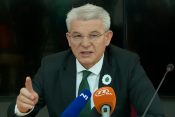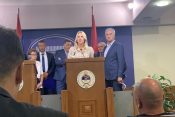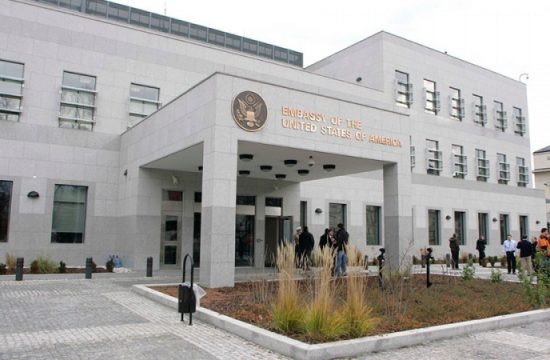
Bosnia’s tripartite Presidency failed to adopt a series of important decisions, including on security agreements with other countries, on Tuesday and the Serb member of the institution, Milorad Dodik, said he voted against them in order to act in accordance with an earlier decision of the parliament of Bosnia’s Republika Srpska (RS) entity.
BiH’s Presidency discussed a wide range of issues at its session on Tuesday but did not adopt any decisions because Dodik voted against every point on the agenda, the Bosniak member of the Presidency, Sefik Dzaforevic, told reporters.
The Presidency failed to adopt a conclusion on the opening of the consulate of the Russian Federation in Banja Luka, on granting agreements to the ambassadors of Belarus and the Dominican Republic, or on the composition of the delegation at the 76th session of the UN General Assembly.
Proposals for approving an agreement between BiH and Turkey on mutual protection and exchange of classified information and a security agreement with the country did not pass in the Presidency, and neither did an agreement with Pakistan on fighting crime and terrorism.
The agreement between BiH and Croatia on amendments to the Agreement on border crossings was also on the agenda, and according to Dzaferovic, Dodik also refused to support that.
Dzaferovic said that this represents Dodik’s attempt to block the Presidency and urged the High Representative of the international community in the country, Christian Schmidt, to react to it – even if it would mean Dodik’s dismissal.
Dodik, however, told reporters after the session that this was not an attempt to block institutions, but that “participation in the work (of the Presidency) in accordance with the conclusions of the RS National Assembly is possible in this way.”
He was referring to a decision political parties in the semi-autonomous RS entity, where he is also the leader of the ruling party, made at the beginning of August over the recently introduced law banning genocide denial.
Schmidt’s predecessor, Valentin Inzko, used his special powers as the officials overseeing the civilian implementation of the 1995 Dayton Peace Agreement in June to impose a law banning genocide and war crimes denial, as well as glorification of convicted war criminals.
This angered political parties in the RS, including opposition parties, and they decided that no RS representatives will participate in the work of state institutions until the matter is resolved.
“We said that there will be no decision-making until all important issues are resolved and put on the public agenda and until the issue of the imposed law, which is unsustainable, is resolved,” Dodik said.
“Today, the agenda included a number of issues related to the political and military competence of the Presidency. No decision has been made. If the situation remains like this and there is no agreement on how to resolve the issue of the imposed law, we will certainly remain in this capacity in which we are, which means that we will vote against everything in the next session,” he said.
He said he spoke to the Speaker of the RS National Assembly, and that they concluded that his participation in the session, but vote against any point on the agenda, is in line with the RS decision.
Dodik also said that the Presidency failed to adopt a decision for BiH representatives to participate in an upcoming summit in Slovenia and that, should someone go to the summit from BiH, they will be doing so privately.
He also commented on Dzaferovic’s request towards the High Representative.
“It is understandable that Bosniaks, Muslims, in BiH want the High Representative to do the things they want,” Dodik said, arguing that this proves that the international official works for the interest of Bosniaks in the country.






Kakvo je tvoje mišljenje o ovome?
Budi prvi koji će ostaviti komentar!